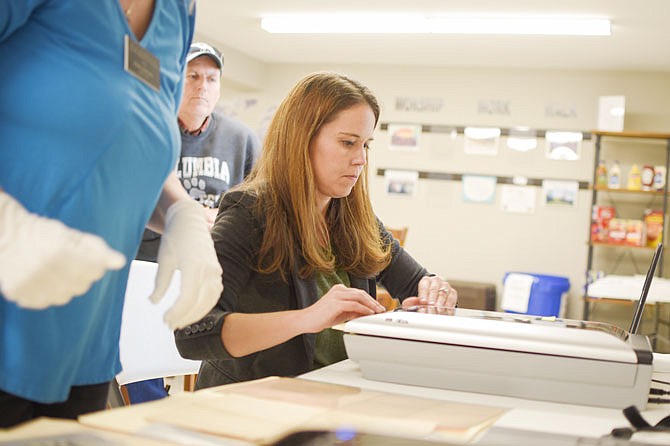Sometimes history is not lost, but people just don't know what it says and a team from the Missouri Humanities Council worked Saturday in Jefferson City to help local people translate and preserve their family artifacts of German heritage.
"It's kind of making me geek out," said Erin Whitson, an archaeologist with the humanities council, as she and Lisa Carrico - director of family and veterans programs for the council - photographed a copy of Harriet Beecher Stowe's "Uncle Tom's Cabin" that was printed in Germany, in German.
Whitson said the anti-slavery novel is reflective of the abolitionist sentiment most German immigrants brought to Missouri.
The book was among the items Steve Weicken, of California, had brought Saturday to Wesley United Methodist Church, where the humanities council's team digitized artifacts and recorded oral histories through brief interviews.
Weicken had also brought some pocket-sized Lutheran hymnals, a print copy of "Die Abendschule" dated 1940, and an accompanying book - that he thought was about botany, judging by the cover artwork - that was once offered for free in exchange for a one year's subscription to "Die Abendschule."
"Die Abendschule" was a German-language family journal published in St. Louis.
Petra DeWitt, assistant professor of history and political science at Missouri University of Science and Technology, translated enough of the journal's ad about the free book to determine what Weicken had thought was a botany book was actually a bound kind of general-interest collection of stories and poems.
Kurt Mueller, of Holts Summit, also didn't know what a family letter in his possession had said until he got it translated Saturday.
The letter, dated 1941, had a censorship stamp - indicating that while being mailed, it had been opened, read and approved by Nazi authorities, and then re-sealed before final delivery - and the message was Mueller's great-grandfather expressing best wishes to family.
"I'm not doing those documents justice" by just keeping them in a metal box in his basement, Mueller later told Sean Rost, an oral historian with the humanities council and State Historical Society of Missouri, as Rost recorded an interview with him.
Mueller had also brought in some of his family's immigration documents, a newspaper story, and a letter from 1945 that was communicating how things were in Germany, from the perspective of a German who had made it to Canada.
"World War II is a big one," Caitlin Yager said of the types of artifacts people bring in, but there are also a lot of immigrant stories, and "a lot of religion," first and foremost - including baptismal certificates, confirmation certificates and Bibles.
Yager, who is the humanities council's director of heritage programs, said one item brought in Saturday had been a baptismal font - complete with a taxidermied bird on top - that had come from the Pilgrim Lutheran Church in Freedom brought by someone from Linn.
Sharon Gulick, of Wardsville, brought in a poem that had been read to her grandparents after their wedding in Wardsville as they prepared to enter their home, an 1857 letter from her great-grandfather to brothers who had already emigrated from Germany to America, and a pair of wooden shoes - presumably worn by her great-great grandmother.
Gulick said the poem to her grandparents, Joseph Kliethermes and Josephine Rackers, was recited by two of their nieces.
The August 1857 letter to brothers Wilhelm and Theodor talked about remaining family in Germany's preparations for leaving for America - selling all the furniture for cash. There was "no stove, no table, no chair, one weaver's loom is also gone already, not a bed is there anymore," and "We have no cupboards anymore and have not any furniture, not even a single table."
Gulick's great-grandfather wrote he intended to be aboard a ship to New Orleans in September 1857.
She said it wasn't clear what motivated his brothers to come to America, but "I'm sure economics played into it," as well as that families' sons in Germany were being forced into military service.
Her family settled in Loose Creek, where they continued to speak a dialect of German no longer spoken in Germany.
Yager said 12 people had signed up to bring items Saturday - usually, about two or three artifacts per person - and Rost had also recorded four or five oral histories, for a total of about 30 minutes of audio.
Rost said much of the information he'd recorded had to do with Cole and Osage counties, and a lot was from the turn of the 20th century.
Yager's hope is to create an online exhibit within the next year that showcases what's been digitized - history that's otherwise been kept behind closed doors.
Not only that, but as evidenced by Jefferson City's May 22 tornado last year, family heritage of historical value can't be assumed to always be safe in an attic, basement or closet; digitization offers a back-up copy.
Yager said the first German heritage digitization event by the council was in Hermann in 2018, followed by one in Perryville.
Yager said a German heritage digitization event is planned for August in Weldon Spring. She said there's been some discussion about future such opportunities for artifacts related to veterans and Native Americans.
More information about the Missouri Humanities Council's German heritage digitization work is available at www.mohumanities.org/german-heritage/.
The council is also having an event Feb. 29 in Hermann about the relationship between Germans and African Americans in Missouri, before and after the Civil War.

